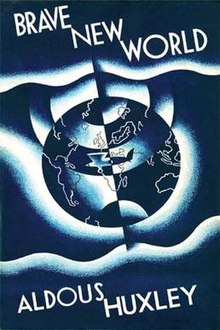
Brave New World is a novel written in 1931 by Aldous Huxley and published in 1932. Set in London of AD 2540 (632 A.F. – "After Ford" – in the book), the novel anticipates developments in reproductive technology, sleep-learning, psychological manipulation, and operant conditioning that combine to profoundly change society. Huxley answered this book with a reassessment in an essay, Brave New World Revisited (1958) and with his final work, a novel titled Island (1962).
In 1999, the Modern Library ranked Brave New World fifth on its list of the 100 best English-language novels ...